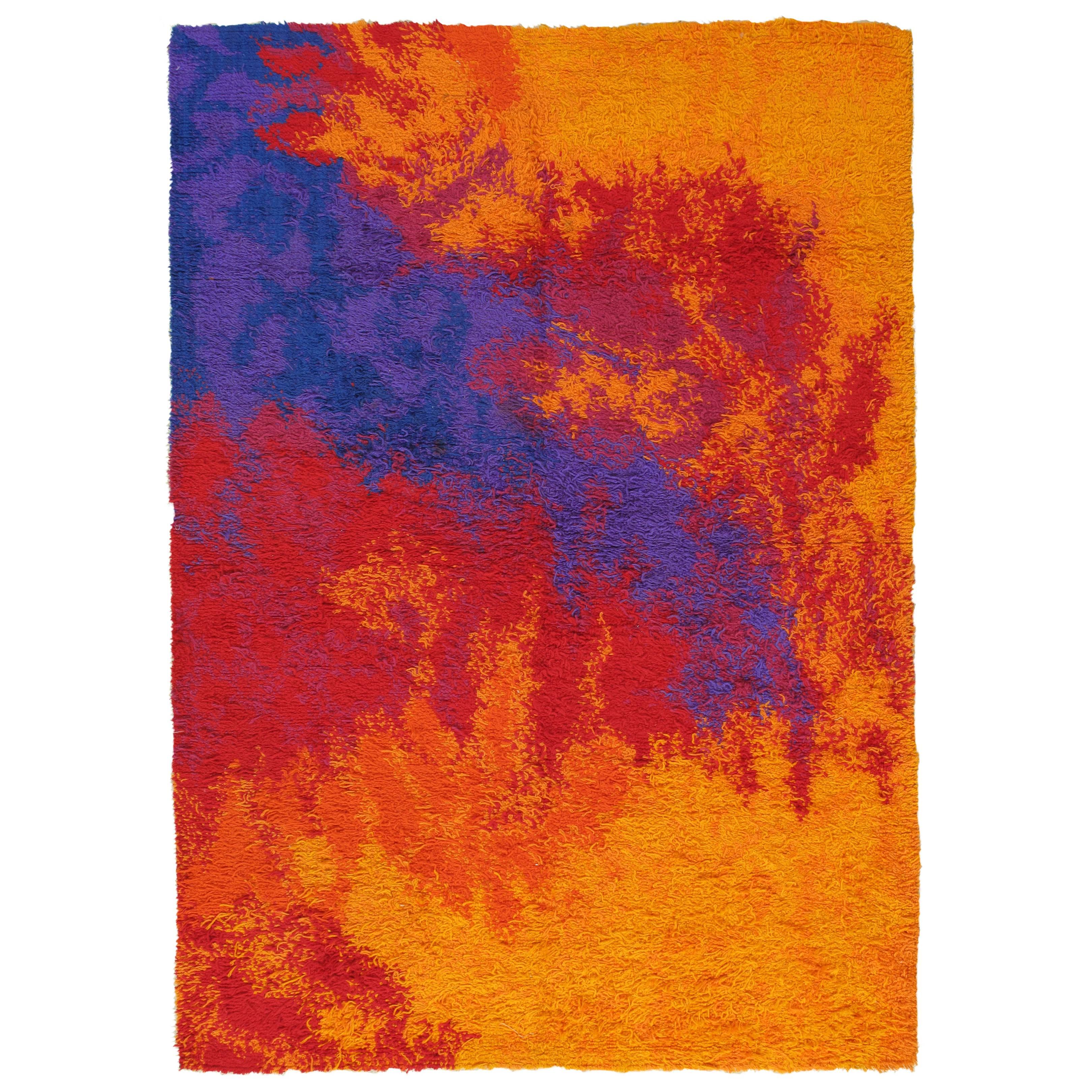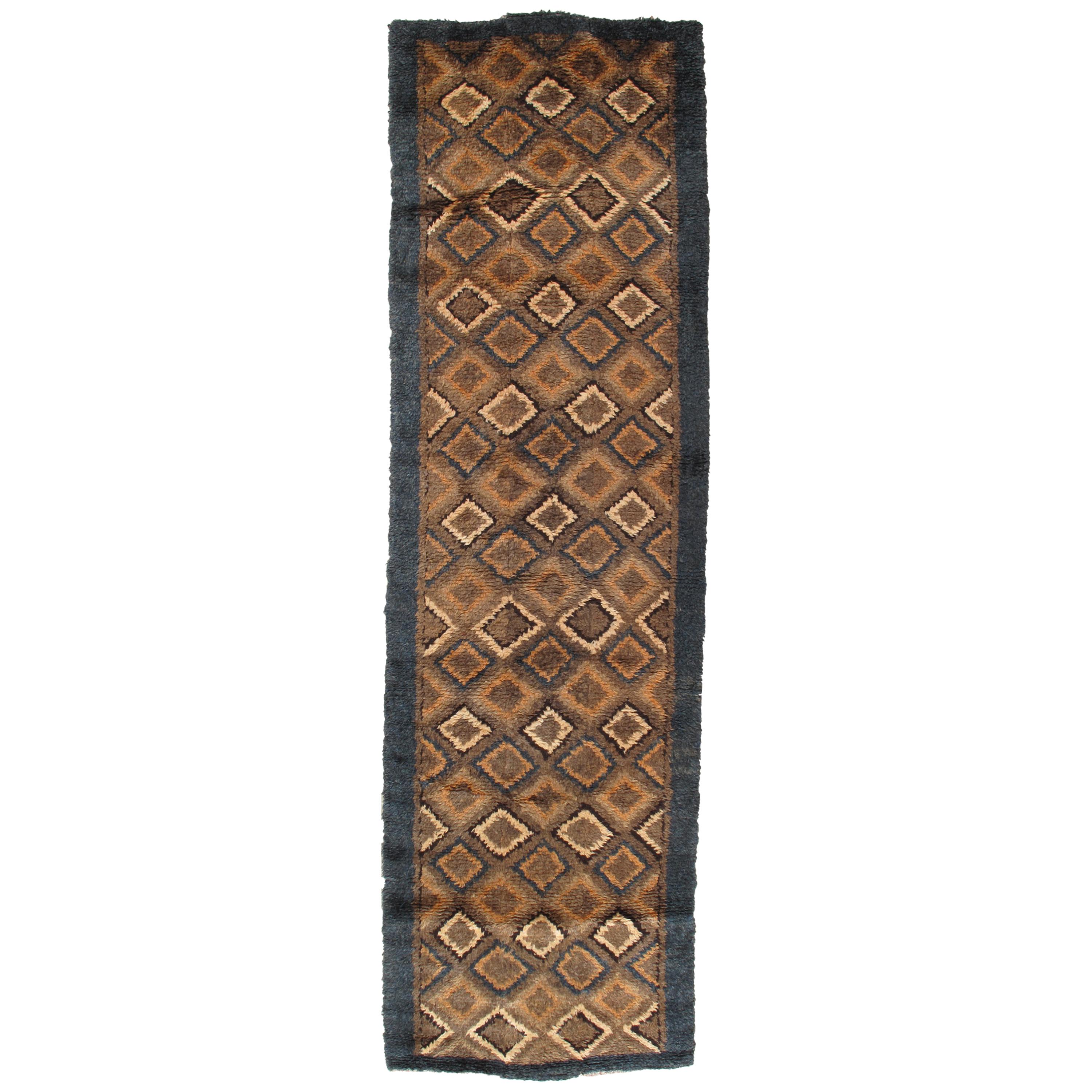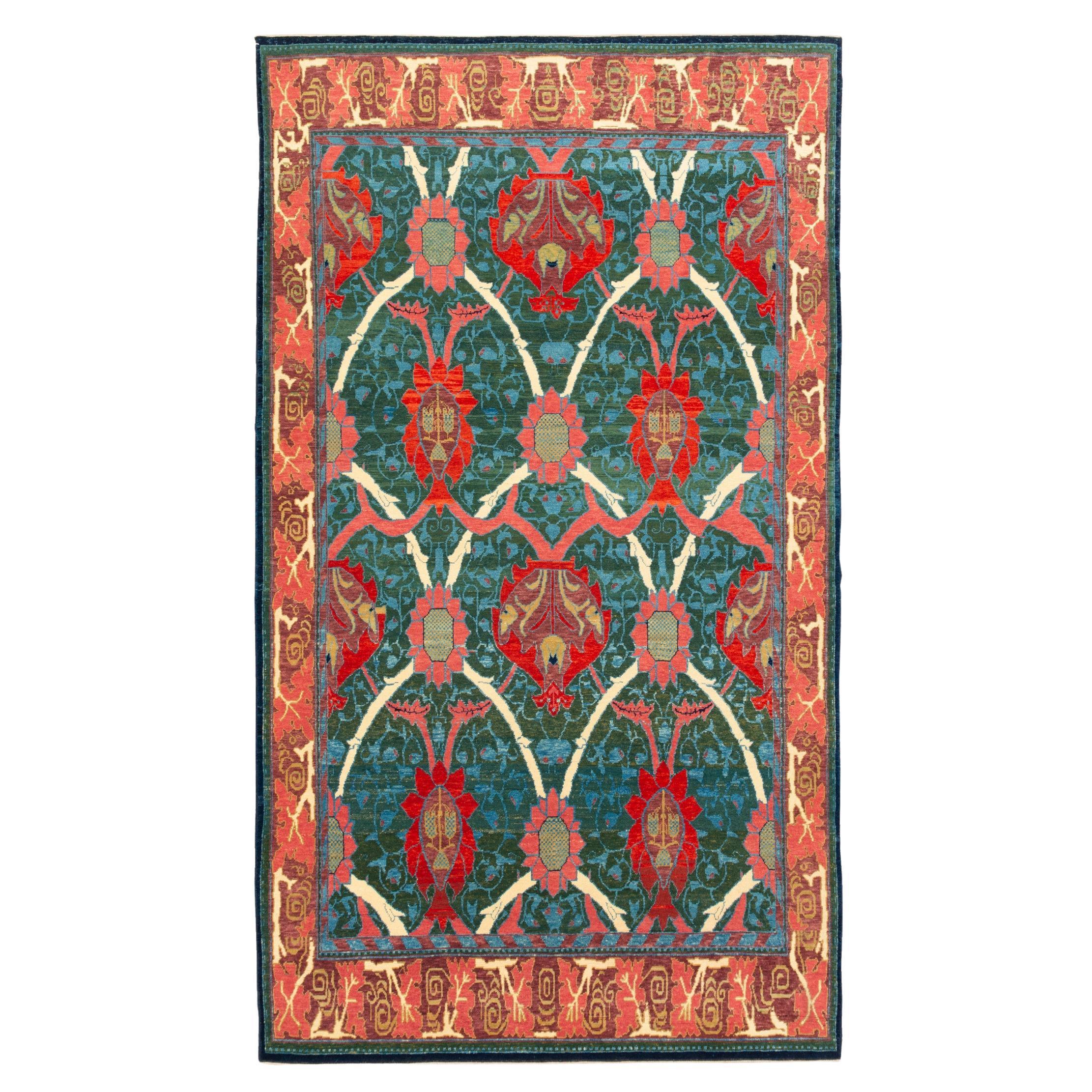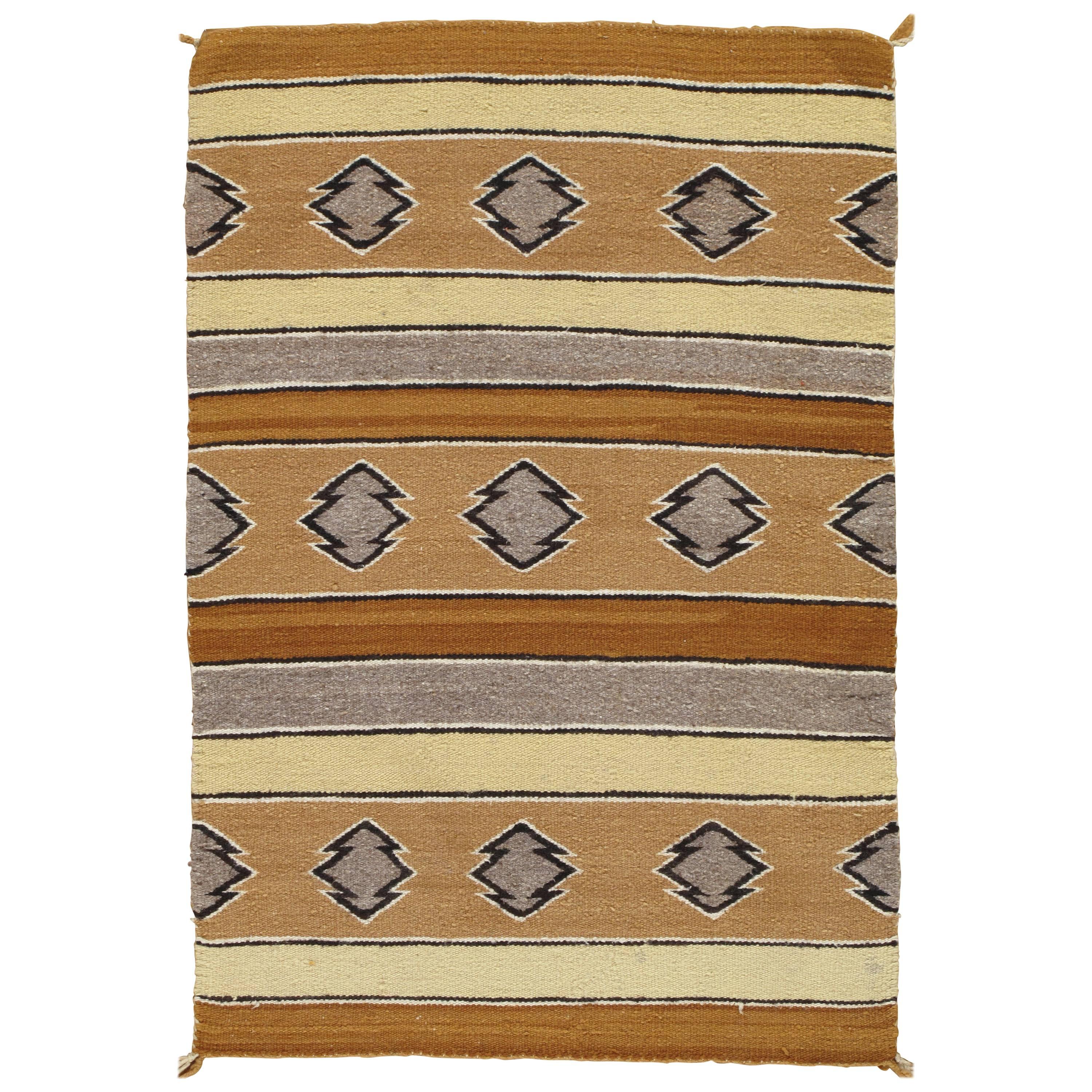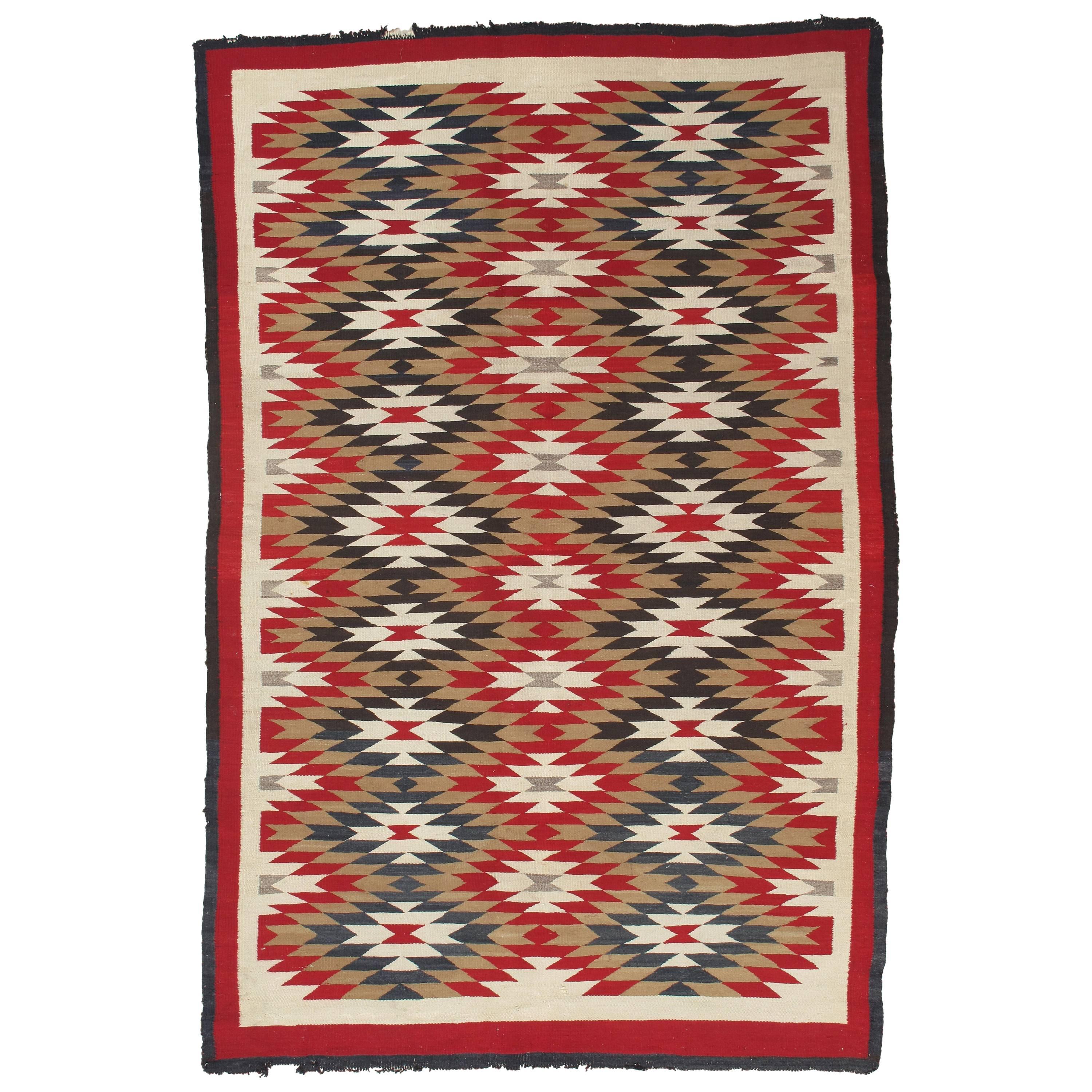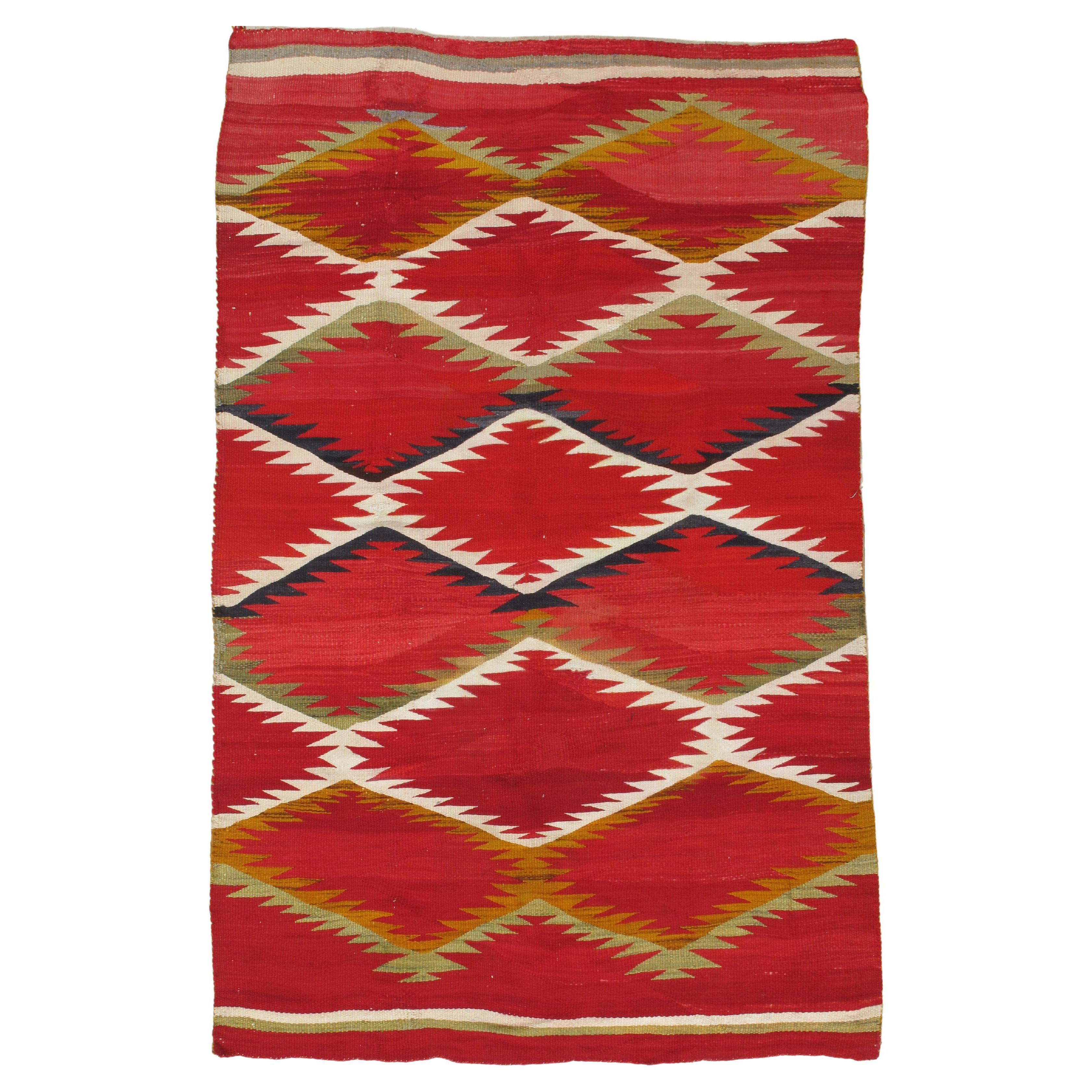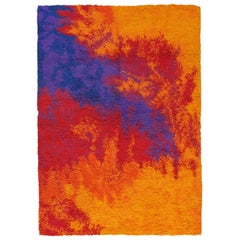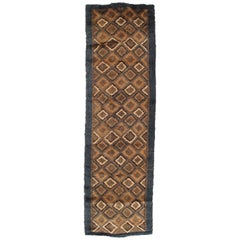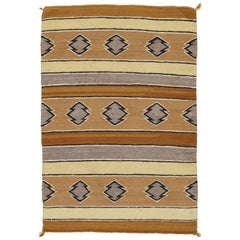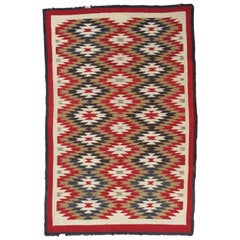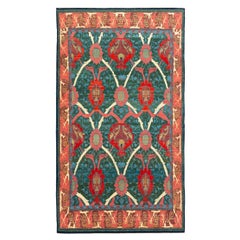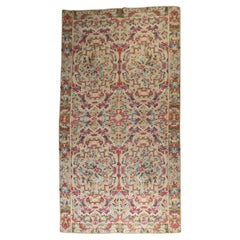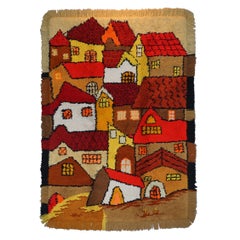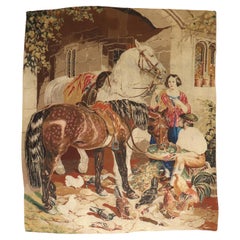Items Similar to Vintage Rya Handmade Carpet, Multicolor Wool Carpet-Colorful, Vibrant, White
Want more images or videos?
Request additional images or videos from the seller
1 of 11
Vintage Rya Handmade Carpet, Multicolor Wool Carpet-Colorful, Vibrant, White
About the Item
Rya rugs are the traditional Scandinavian rugs made in Sweden and Finland, and word “Rya” actually means Rug. The vintage Scandinavian Rya rugs that were made in Sweden have extremely long, dense pile and were inspired by the Turkish “Yataks” or bedding rugs. Simple patterns, stripes and geometric designs are emblematic of these textural treasures. Thanks to the recent revival of Mid-Century decors the vintage Swedish Rya rugs seem to have made a strong comeback.
Interior designers and decorators from all four corners of the world are seeking out vintage rugs from Scandinavia and more specifically the Mid-Century vintage Rya rugs because of their Art Deco feel and modernist designs. From all the different types of Scandinavian carpets, the Rya rugs are easiest to recognize due to their pile which is much like the modern day “shag carpets”.
Scandinavia’s fantastic vintage Rya Rugs are modernist, luxurious and superbly stylish. With such rich textures, bold colors and abstract designs, it’s not surprising that these luscious mid-century rugs are working their way back into modern interiors.
This carpet has an unusual large size, making it a possible custom order made for a special sized large room. Size 9'8"x17'10".
- Dimensions:Width: 116 in (294.64 cm)Length: 214 in (543.56 cm)
- Materials and Techniques:Wool,Hand-Knotted
- Place of Origin:
- Period:
- Date of Manufacture:1950
- Condition:Wear consistent with age and use.
- Seller Location:Port Washington, NY
- Reference Number:Seller: RR215751stDibs: LU96418128973
About the Seller
5.0
Vetted Professional Seller
Every seller passes strict standards for authenticity and reliability
Established in 1980
1stDibs seller since 2013
153 sales on 1stDibs
Typical response time: 3 hours
- ShippingRetrieving quote...Shipping from: Port Washington, NY
- Return Policy
Authenticity Guarantee
In the unlikely event there’s an issue with an item’s authenticity, contact us within 1 year for a full refund. DetailsMoney-Back Guarantee
If your item is not as described, is damaged in transit, or does not arrive, contact us within 7 days for a full refund. Details24-Hour Cancellation
You have a 24-hour grace period in which to reconsider your purchase, with no questions asked.Vetted Professional Sellers
Our world-class sellers must adhere to strict standards for service and quality, maintaining the integrity of our listings.Price-Match Guarantee
If you find that a seller listed the same item for a lower price elsewhere, we’ll match it.Trusted Global Delivery
Our best-in-class carrier network provides specialized shipping options worldwide, including custom delivery.More From This Seller
View AllVintage Rya Carpet, Swedish Rug, Colorful
Located in Port Washington, NY
1960s Swedish Rya rug with a colorful, plush wool pile. Size: 4'6" X 6'7".
Category
Mid-20th Century Swedish Mid-Century Modern Western European Rugs
Materials
Wool
Vintage Rya Carpet, Swedish, Soft Colors, Mid-Century Modern
Located in Port Washington, NY
1950s Swedish Rya rug with plush wool pile. Measures: 2'11" x 9'9".
Category
Mid-20th Century Swedish Mid-Century Modern Western European Rugs
Materials
Wool
Vintage Navajo Carpet, Folk Rug, Handmade Wool, Beige, Caramel, Tan
Located in Port Washington, NY
Navajo rugs and blankets are textiles produced by Navajo people of the four corners area of the United States. Navajo textiles are highly regarded and have been sought after as trade...
Category
Mid-20th Century American Navajo North and South American Rugs
Materials
Wool
$1,599 Sale Price
20% Off
Free Shipping
Vintage Navajo Carpet, Folk Rug, Handmade Wool, Beige, Red, Tan
Located in Port Washington, NY
Navajo rugs and blankets are textiles produced by Navajo people of the four corners area of the United States. Navajo textiles are highly regarded and have been sought after as trade...
Category
Mid-20th Century American Navajo Rugs
Materials
Wool
$6,299 Sale Price
30% Off
Free Shipping
Antique Navajo Carpet, Folk Rug, Handmade Wool, Red, Black, White, Green
Located in Port Washington, NY
Navajo rugs and blankets are textiles produced by Navajo people of the four corners area of the United States. Navajo textiles are highly regarded and ...
Category
Antique Late 19th Century American Navajo North and South American Rugs
Materials
Wool
$9,749 Sale Price
25% Off
Free Shipping
Antique Handsome Serapi Carpet, Handmade Wool Carpet Red Navy, Light Blue, Ivory
Located in Port Washington, NY
19th century Persian Serapi carpets are some of the most highly prized and sought-after antique Persian carpets in the world. They are characterized by their bold, geometric designs, vivid colors, and exceptional quality.
Serapi carpets were originally woven in the Heriz region of northwestern Iran, but the term "Serapi" was coined by Western carpet dealers in the late 19th century to distinguish a higher-quality version of the Heriz carpet. Serapi carpets were made using the finest wool, which was dyed using natural, vegetable-based dyes. The wool was then spun by hand and woven into carpets using a symmetrical knotting technique.
One of the defining features of 19th century Persian Serapi carpets is their bold, large-scale geometric designs. These designs often feature medallions, rosettes, and intricate borders, rendered in a palette of rich, saturated colors such as crimson, indigo, and gold. The colors used in Serapi carpets were achieved through a painstaking dyeing process that involved boiling the wool in vats of natural dyes, such as madder root or indigo.
Another hallmark of 19th century Persian Serapi carpets is their durability and sturdiness. The wool used to make these carpets was of exceptional quality, with a high lanolin content that made it resistant to wear and tear. Additionally, the carpets were woven with a tight, dense pile that added to their strength and longevity.
The size of 19th century Persian Serapi carpets is another factor that sets them apart from other antique Persian carpets. These carpets were typically large, with sizes ranging from 9 feet by 12 feet to 12 feet by 18 feet. Their large size was made custom for use in grand, formal spaces such as ballrooms and reception halls.
Overall, 19th century Persian Serapi carpets are considered to be some of the most beautiful and valuable...
Category
Antique Late 19th Century Persian Serapi Persian Rugs
Materials
Wool
$12,799 Sale Price
20% Off
Free Shipping
You May Also Like
Ararat Rugs Holland Park William Morris Carpet, Arts and Crafts, Natural Dyed
By Ararat Rugs
Located in Tokyo, JP
The source of carpet comes from the book Arts & Crafts Carpets, by Malcolm Haslam, and David Black, 1991, fig.49. This Hammersmith carpet was designed by William Morris in 1882, in the United Kingdom. In 1887 English artist and bookbinder T.J. Cobden Sanderson, suggested that a new group be named the “Arts and Crafts Exhibition Society” As a result, he was the first to use the term “Art and Crafts” and also is credited with naming this new emerging movement. The Arts & Crafts movement was inspired by the degradation of product standards that resulted from the factory production age. The rise of machinery in manufacturing caused a noticeable decline in uniqueness and crafts. These anti-Industrial reformers promoted economic advancement and social change. They wanted to eliminate poor quality and “artificial” items from 19th century British society. They saw a plethora of uninteresting items on display at the Great Exhibition of 1851 and became inspired to launch a Campaign for originality and uniqueness.
William Morris was an English designer, as well as an uplifting social activist and writer. Morris is credited with sparking the rebirth of textile arts and traditional means of production. In 1861, Morris and a small group of designers opened an incredibly fashionable design company that grew to be largely successful. Morris left behind works in many different mediums such as textiles, books, furniture, stained glass, and area rugs. But in the end, he is most remembered for the magnificent wallpapers that he designed. He got much of his inspiration from the natural world. Through his interior decor pieces, Morris set out to convert rooms or spaces into meadows with beautiful trees meandering, vines, and plants. This concept of taking something Industrial and man-made, and converting it into something natural is what William Morris meant when he once said: “-any decoration is futile… when it does not remind you of something beyond itself.”
Morris was a huge commercial success and his works are some of the most sought-after pieces in the world of design and decor. He is also credited with almost single-handedly reviving the British textile arts as well as their methods of production. Morris was also severely critical of machine-made goods, exclaiming, “Today almost all wares that are made by civilized man are shabbily and pretentiously ugly.” Houses were filled “with tons and tons of unutterable rubbish,” which, he suggested, should be heaped onto a gigantic bonfire! “As a condition of life, production by machinery is altogether evil.” He masterminded one of the most well-known styles of Arts & Crafts, recognizable by its twisting and arching patterns and simple, elegant floral design prints. Although Morris believed that Persian carpets were the greatest ever made, he adopted the coarser Turkish (Ghiordes) knot for his hand knotted carpet manufacture. They were woven at a thickness of 25 knots to the square inch at that time. Morris & Co.’s rugs are reminiscent of Persian garden design carpets in that they are smartly styled depictions of English gardens. Donegal also started producing highly desirable Irish rugs in the late 19th century. The Donegal rugs were predominantly created by English architects C.F.A. Voysey and Gavin Morton. The handcrafted Voysey rugs are typically woven in England, Scotland, and Ireland. Voysey had a knack for using contrasting shapes to decorate flat monochromatic spaces. Dark outlines added a flair of drama to his signature pattern and Celtic rug...
Category
21st Century and Contemporary Turkish Arts and Crafts Western European Rugs
Materials
Wool, Organic Material, Natural Fiber
$5,360 Sale Price
20% Off
Free Shipping
Zabihi Collection Dramatic Mid 19th Century English Needlepoint
Located in New York, NY
Dramatic mid 19th Century English Needlepoint ~
7'7'' x 16'3''
English needlepoint rugs, renowned for their profuse floral motifs, reached an artistic zenith in 1700-1750 but were...
Category
Antique Mid-19th Century English Aubusson Western European Rugs
Materials
Wool, Cotton, Foam
Stunning Large Shag Pile Rug Depicting Houses in the Style of L.S Lowry
By L. S. Lowry
Located in West Sussex, Pulborough
We are delighted to offer for sale this lovely brand new Shag Pile run depicting L.S Lowry style houses
A very comfortable and thick rug, extremely well made and clearly Lowry in...
Category
20th Century English Mid-Century Modern Western European Rugs
Materials
Wool
$2,151 Sale Price
20% Off
Zabihi Collection Horse Scene English Needlepoint
Located in New York, NY
an early 20th-century square size English Needlepoint
Measures: 6'10'' x 7'8''
Category
Early 20th Century English Aubusson Western European Rugs
Materials
Wool, Cotton, Foam
Vintage Maras Old Kilim Anatolian Rug Turkish Carpet Wool
Located in Tokyo, JP
This is a South Eastern Anatolian Old Kilim from the Maras region with a rare and beautiful color composition.
Category
Late 20th Century Turkish Kilim Turkish Rugs
Materials
Wool, Natural Fiber
Bayburt Kilim Rug Vintage Wool Old Eastern Anatolian Turkish Carpet
Located in Tokyo, JP
This is Eastern Anatolian Old Vintage Kilim from the Bayburt region with a rare and beautiful color composition.
This highly collectible antique kilim has wonderful special colors ...
Category
Mid-20th Century Turkish Kilim Turkish Rugs
Materials
Wool, Natural Fiber
Recently Viewed
View AllMore Ways To Browse
Western Vintage Revival
1960s Egg Chair
2 Bergere Chairs
20 Round Walnut Table
22 Inch Wide Entry Table
70s Couch Sectional
70s Sectional Sofa
8 Scarpa Chairs
Adi Coffee Table
Afra And Tobia Scarpa 121 Dining Chair
Alky Chair Giancarlo Piretti
Alky Chair
Antique Dining Table With Pull Out Leaves
Antique Loveseat Sofa
Antique Victorian Button Back Chair
Antique Wash Bowl Set
Antique Wood Bar Cart
Apartment Sized Dining Tables
